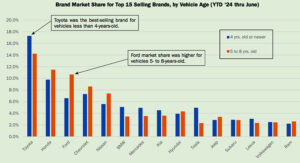‘The one thing our industry has — that dealers and OEMs don’t have — are our numbers’

I had the opportunity to catch up with the Auto Care Association’s Aaron Lowe, who was fresh off a morning bike ride, for a cup of coffee this summer on Cape Cod, Mass., where he and his wife had just moved for retirement from the Washington, D.C., area.
Aaron shared his thoughts on his career on his final day before retirement, a career that was jump-started by answering a blind employment ad for the Automotive Parts and Accessories Association, which escalated to his role as senior vice president of regulatory and government affairs, where he oversaw the Auto Care Association’s federal and state efforts, including Right to Repair.
The following are a few outtakes from our conversation.
Today is your last day. How does that feel?
Bittersweet. I’m going to miss 40 years at one place and doing the work for the Auto Care Association and the aftermarket. It’s been a great, incredible experience. I’m definitely going to miss many people I’ve met and worked with and our industry issues, but I’m ready for the next chapter in my life. When I think back, I’ve been very fortunate. I’ll still be doing some consulting work with the association, especially Massachusetts Right to Repair to make sure we’re continuing to move that effort forward, as well as help the new team transition and get up to speed on the issues.
In addition to Right to Repair, what do you consider other highlights of your career?
Working on the 1990 Clean Air Act amendments that resulted in the requirement for onboard diagnostic systems; making sure the industry can stay competitive in international trade; safety standards; and working with the Federal Trade Commission to enforce the Magnuson law requirements so vehicle owners know they can get their car repaired where they want and not void their warranty. The best part of the job has been able to help a lot of businesses be competitive and profitable while serving the motoring public — that’s been the most rewarding. It’s great to go to sleep at night knowing we’re getting something done.
What did you know about the aftermarket when you first got your start?
I had a car and got it repaired, but like most people, you don’t think about it that much and all the aspects that go into a repair — parts coming from the manufacturer to a distributor to a shop. You bring your car for service in the morning and pick it up in the evening, but so much happens to make sure that parts are there and that the technician is trained and has the tools and information needed. It’s an incredible industry, and the more I learned about it the more I got to respect the people in it and a lot of family-owned businesses. Amazing people.
So where is the aftermarket on the public and legislators’ radar?
I don’t think most of the public understands or appreciates it. We spend a lot of time explaining to legislators and people on Capital Hill — some who don’t even own cars — who we are as an industry, what we do, how important we are to the U.S. economy and how critical to the nation’s infrastructure we are. When they start thinking about it, they kind of get it, but at first they say, ‘You mean there’s a trade association for the automotive industry?’ And I’m like, ‘Well, actually, there’s several.’”
They usually think about the manufacturers and dealers, and, truthfully, a lot of it is political. The car companies and dealerships are very active politically, whereas our aftermarket industry isn’t [by comparison]. And that’s something we’ve been working to change by informing legislators who we are — and not just when we need something, but so that they can become more knowledgable about us and create awareness. It’s important for us to be active. We really need to make our voice stronger, and there’s a lot of legislation happening in states that affects our industry where that voice is important. We have to constantly defend our ourselves in the states and Congress to protect our interests from dealers and manufacturers.
Since you began your career to today, how much has awareness for the aftermarket grown from state to federal levels?
It’s grown a lot. I’ve really seen people begin to appreciate what we can accomplish, especially after the Right to Repair battles, and they say, ‘Wow, this is really important,’ and it’s something that our industry can have an impact on. But we still have a long way to go when you look at what the dealers and manufacturers do every day. The one thing our industry has, that they don’t have, are our numbers. We have tons of people and public support — when they’re aware of us. We’ve conducted polling in Massachusetts and it’s incredible how much they trust independent shops, where they’ve gone to for years and family before them had gone to for repairs. They develop relationships, and when they learn they might lose the ability to go to their independent shop, they really didn’t like it. They trust their shops and technicians.
Strength in numbers?
I would love to see more people in our industry show how proud they are of it, and we need to think more about how important we are. Our members are so independent and have a lot of entrepreneurial spirit, which is great, but we also have to think politically as an industry together. There’s a lot of new technology coming down the road, and the manufacturers are looking at the aftermarket much differently than they used to, as evidenced by how much money they spent in Massachusetts — $30 million to try to defeat Right to Repair legislation wasn’t just for the fun of it. But we won and consumers are on our side. For years, the dealers and manufacturers thought the repair side was a ‘throw away’ and they never valued servicing vehicles, they just wanted to sell them. That has all changed. Now they want to control the [repair] data. We need to continue to win those battles, but the industry needs to wake up more and be part of the fight. (See Aftermarket Matters’ exclusive, “OEMs seek control of entire aftermarket supply chain“)
What will you miss most about the industry?
The people. We have such a great staff at the Auto Care Association and they’ve really helped make all this possible — everything that we’ve achieved was because of their efforts with a can-do spirit. I’m going to miss many friends in the industry and I’m hoping to continue working with them to some extent.
Who were your mentors?
Oh, my gosh. If I miss somebody it’ll drive me crazy. I have to mention the fact that I’ve been very fortunate to have a wife who’s been very supportive, especially in the time I’ve spent away from home. She’s allowed me to do a lot of these things and be successful. I can also tell you that people such as Mort Schwartz, were hugely important to me. Linda Hoffman, who used to have my job decades ago at the association and I inherited the position from was an incredible mentor. Bill Hanvey (president and CEO of the association) has been amazing in his support and has helped me with his commitment to government affairs and making the association great. Rodney Pierini (president and CEO of CAWA) has been incredible in helping us in California and he deserves a lot of credit for how he leads that association and our efforts. State groups and their leaders have been so important to us, such as has Ray Pohlman, of the Coalition for Auto Repair Equality, formerly with Autozone, for his government affairs and being a mentor and teammate. There have also been many people who have passed away like John Goodman who ran California’s Automotive Service Councils; then there’s Jack Heyler, who was instrumental in the onboard diagnostic systems development. I’ve been very lucky to work with really great people who have moved the industry forward.
I’ve enjoyed my career and it’s been fun, but there comes a point where it’s time for that new chapter and give opportunities to new, upcoming people.







Comments are closed.